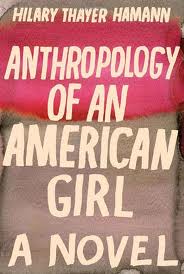Mid-Novel Review: Anthropology of an American Girl
 Last summer, my fabulous friend Allison me a copy of Anthropology of an American Girl by Hilary Thayer Hamann. It was accompanied with a birthday card that read something like this…
Last summer, my fabulous friend Allison me a copy of Anthropology of an American Girl by Hilary Thayer Hamann. It was accompanied with a birthday card that read something like this…
Outside:Â
A good friend will visit you in jail.Â
A great friend will bail you out.
Inside: (With a note at the top from Allison in her typical purple script that said, “Let’s just call a spade a spade…â€)Â
A friend like me will be in the next cell.
That’s Allison in a nutshell, and it explains part of why I adore her. Needless to say, I don’t take her book recommendations lightly. When she gifted me American Girl I was sure that it would be a keeper.   I put the book in my extensive “to read†pile and let it percolate there for a while.Â
Last month, I finally arrived at it, and I’m now roughly 1/3 of the way through. Normally I tear through books much faster than this, but Hamann’s tale just isn’t that kind of a read.Â
I read a lot of young adult fiction. I mean, a lot. So I’m used to a particular vernacular, a specific style, and a very different pace. Right off the bat, it was clear that this book would require commitment. The novel follows Eveline, a girl on the brink of adulthood on Long Island and then in New York City in the late 70s and early 80s. She’s artistic and almost painfully observant of the world around her. At times she comes across as merely a passive watcher. She’s so vastly different from who I am, and who I was at that age, that it took me some time to adjust to the frustration of letting this character stumble. I still have to work hard not to scream at the pages, Why doesn’t she do anything?! And in fact, very little actually happens. The plot is arguably slow, and the language dense. At first, I would read bits aloud, rolling my eyes at the laborious vocabulary.Â
But I trusted Allison, and I persevered.
And, indeed, I’ve found that the book speaks to me. It isn’t a page-turner.  I’m taking my time with it. I’m surrendering to the language and the narrative arch, without letting the book become an action item. As a writer, I’m often told to read everything—even the bad stuff—and so there are times when I push through a text that I’m not enjoying for the sake of finishing it, analyzing it, and determining why it wasn’t successful.Â
This isn’t like that. It’s rich. Packed with gems that I remember long after turning the page. I let the words roll around in my head—and my mouth, at times—as they work their magic. The tone is haunting and dark. Now, I’m hard-pressed to find sections that I find so irritatingly wordy. I’m fully engaged in the world that Hamann has created.Â
Unlike much of what I read and write, Anthropology of an American Girl is an adult novel about a teenage girl. (And I expect that this will become even more pronounced as Eveline ages in the novel and faces more adult conflicts and situations.) In this way, it reminds me of Prep by Curtis Sittenfeld, in which an adult woman reflects back on her high school years. I’m used to reading books written about teenagers, for teenagers. This is another obstacle that I initially faced when I came to the American Girl. Hamann’s work is wrought with adolescent angst, but I’m confident that Eveline navigates the same issues of identity as many adults. She’s confined by the relationships around her, even as she wrestles against them.Â
Here I am, more than a decade out of high school, and I still wonder who I am. I battle the assumptions and limitations placed on me by the other people in my life and my relationship to them. For that matter, I struggle with my own expectations of myself and others.  Hamann taps into the reality that, as humans, we are inextricably connected to other people. We’re bound by the culture in which we’re raised; to the schools we attend; to the country where we live. This interconnectedness is simultaneously glorious and wonderful, limiting and agonizing. Eveline never stops looking inside at who she is, individually, outside the definitions of these relationships. Indeed, should any of us?
Read more about the book and the author here:Â http://www.anthropologyofanamericangirl.com
And more about Curtis Sittenfeld and her books here:Â http://www.curtissittenfeld.com
And don’t forget to check out Allison (a.k.a. Fortune Cookie Junkie)’s blog at http://www.notafortune.com/